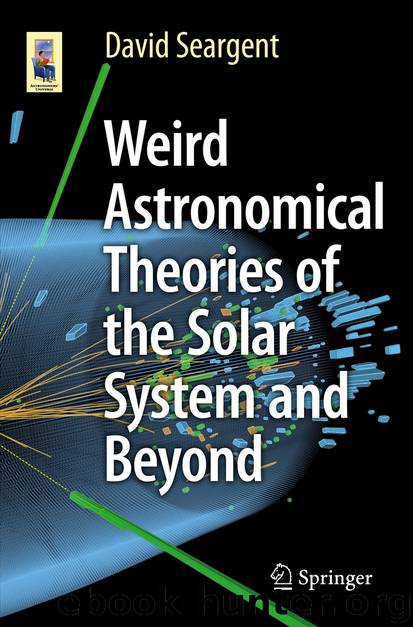Weird Astronomical Theories of the Solar System and Beyond by David Seargent

Author:David Seargent
Language: eng
Format: epub
Publisher: Springer International Publishing, Cham
Do Jupiter’s Comets Quickly Fade Away?
Be that as it may, further research has likewise largely dispensed with the other big hurdle for the capture theory, namely, the short lifetimes of Jupiter’s comets. As each of these hurdles erected in the path of the capture theory equally acted as supports for Vsekhsvyatskii ’s thesis, the latter naturally lost its appeal as the former gained strength.
Concerning the average lifetimes of Jupiter’s comets, no-one is denying that certain members of the Jovian family have faded and there is no disputing that several have disappeared altogether, presumably breaking up and disintegrating just as Vsekhsvyatskii envisioned. Yet others have had their orbits so altered that they no longer approach as closely to the Sun and Earth and have become invisible and, maybe, inactive for wont of solar warmth. But the disintegrating comets were either old objects already nearing the end of their lives by the time of their discovery or else they were atypically small and/or fragile bodies that simply could not last the distance. For the most part, the apparent fading that Vsekhsvyatskii believed he had found and on which he based his thesis of the very rapid decay of short-period comets has not been supported by more recent studies.
There are several reasons why Vsekhsvyatskii was mistaken about this matter. For a start , a number of short-period comets had been unusually bright at their discovery apparition. Indeed, it is this that brought about their discovery. Sometimes this extra luster has been due to one of the outbursts that some comets experience from time to time. Several comets have also been discovered shortly after their orbits had been drastically altered by a close passage of Jupiter, such that they came to approach the Sun far closer than they had during their previous (unobserved) returns. Quite often, a comet will appear extra lustrous on its initial passage—or even during its first two or three passages—through a smaller perihelion distance, presumably because previously undisturbed deposits of ice on its surface are boiled away at their first experience of significant solar heating. Although these cases might be cited as instances of cometary fading, they are not the sort of fading that is synonymous with decay. It would be better to think of these comets at their initial return(s) as displaying an anomalously high brightness which returned to normal during later appearances.
There is, however, a more general reason why periodic comets appeared to fade between the mid nineteenth and mid twentieth centuries; and it has nothing to do with decay of the comets themselves. The reason lies in the way in which they were observed in earlier years. Back in the mid 1800s, astronomers observed comets visually using telescopes of what were, by today’s standards, of rather small aperture. Because of the modest aperture of these instruments, the magnifications employed were also low or moderate. Now, paradoxical though it might seem, when the typical comet is observed under high magnification, it appears smaller than when seen through a wide-field telescope at low power.
Download
This site does not store any files on its server. We only index and link to content provided by other sites. Please contact the content providers to delete copyright contents if any and email us, we'll remove relevant links or contents immediately.
Tools of Titans by Timothy Ferriss(8346)
Turbulence by E. J. Noyes(8001)
Secrets of Antigravity Propulsion: Tesla, UFOs, and Classified Aerospace Technology by Ph.D. Paul A. Laviolette(5357)
Astrophysics for People in a Hurry by Neil DeGrasse Tyson(5169)
Room 212 by Kate Stewart(5089)
Design of Trajectory Optimization Approach for Space Maneuver Vehicle Skip Entry Problems by Runqi Chai & Al Savvaris & Antonios Tsourdos & Senchun Chai(5054)
Pale Blue Dot by Carl Sagan(4981)
The David Icke Guide to the Global Conspiracy (and how to end it) by David Icke(4684)
A Journey Through Divination and Astronomy by Publishing Pottermore(4369)
Goodbye Paradise(3790)
Apollo 8 by Jeffrey Kluger(3689)
COSMOS by Carl Sagan(3603)
The Five People You Meet in Heaven by Mitch Albom(3544)
Losing the Nobel Prize by Brian Keating(3526)
How to Read Water: Clues and Patterns from Puddles to the Sea (Natural Navigation) by Tristan Gooley(3444)
Brief Answers to the Big Questions by Stephen Hawking(3408)
How to Read Nature by Tristan Gooley(3314)
The Order of Time by Carlo Rovelli(3173)
A Brief History of Time by Stephen Hawking(3007)
